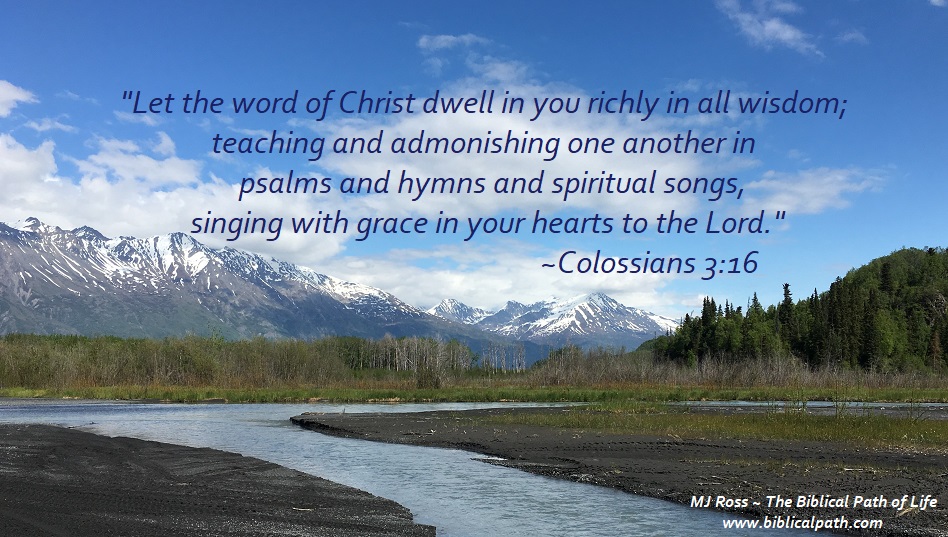
“Let the word of Christ dwell in you richly in all wisdom; teaching and admonishing one another in psalms and hymns and spiritual songs, singing with grace in your hearts to the Lord.”
(Colossians 3:16)
The following is an excerpt from “The Biblical Path of Life – Year One Quarter Four”, Lesson 2:
“Many of the Psalms were written when different men approached God in prayer because of circumstances surrounding them. You can see instances of great sorrow, admitted sin, repentance, hope and trust in God, faith, and a great love for God. Throughout Psalms, man’s prayers from the heart turn to singing in that prayer, ending with man praising God, revealing that the Psalms are not only prayers from the heart but songs as well. Some were written in praise and adoration of who God is versus who man is. So many of these hymns are rich in Israel’s history. If we know the history, we will better understand the circumstances surrounding many of these songs.
“In the book of Psalms, we find God is infinite, sovereign. Yet despite man’s failings, God still communicates with man, and allows man to communicate with Him…
“One of the most important things we can recognize from the first book of Psalms is the recognition of God and His dealings with mankind. Not only does God care about man, but He is in constant contact with him. We will look at Psalm 8 to help us understand just one recorded instance of God’s specific love and care for man. “3. When I consider thy heavens, the work of thy fingers, the moon and the stars, which thou hast ordained; 4. What is man, that thou art mindful of him? and the son of man, that thou visitest him? 5. For thou hast made him a little lower than the angels, and hast crowned him with glory and honour. 6. Thou madest him to have dominion over the works of thy hands; thou hast put all things under his feet: 7. All sheep and oxen, yea, and the beasts of the field; 8. The fowl of the air, and the fish of the sea, and whatsoever passeth through the paths of the seas. 9. O LORD our Lord, how excellent is thy name in all the earth!” (Psalm 8:3–9).
“David began by reflecting again on God’s creation of the world. Such power; how could God even consider any dealings with man, let alone have a one-on-one relationship with man? (Visited here means “an action on the part of God which produced a profitable result for His people. The first time that word was used was in Genesis 21:1 when God ‘visited’ Sarah. She conceived the promised son, Isaac, when she was very old.”) God chose to reveal Himself to the people who became the nation Israel, descendants of Abraham, Isaac, Jacob, and Joseph. He chose this family—Abraham and his wife, Sarah, who had no children—and gave them a child to show Himself mightily to them and to all of the world.
“David then recognized that God made mankind just “a little lower than the angels.” Not only that, but He “crowned him with glory and honor.” God made man very special. He even gave mankind dominion over the creatures of the world (see Genesis 1:26; 9:2).
“David ended this acknowledgement of God’s choosing to have a special relationship with man with these words: “O LORD our Lord, how excellent is thy name in all the earth!” (Psalm 8:9).”
Understanding these things, consider the following verse: “Let the word of Christ dwell in you richly in all wisdom; teaching and admonishing one another in psalms and hymns and spiritual songs, singing with grace in your hearts to the Lord” (Colossians 3:16). The following definitions can help in the understanding of this verse.
- word of Christ: “refers to the revelation that Jesus brought into the world, which is undiscoverable except by God and the Scriptures”.
- wisdom: “practical wisdom; sound judgment; good sense”.
- teaching: “to advise or put in mind, as a tutor would do”.
- admonishing: “to caution or reprove gently; to warn”.
- hymns: “a song sung in praise to God”.
This verse should help us understand the importance of reading and understanding the Psalms recorded so long ago for us. The Psalms are so much more than just songs sung as praises to God, by they are also to instill wisdom and good judgment in our hearts and minds to teach us how to live lives pleasing to God.
Have you taken time to read and understand the Psalms, understanding that God wants to have a special relationship with you?
Leave a Reply